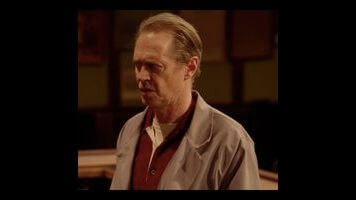Take the big scene with Horace and Maggie (Nina Arianda) where Maggie details her brief marriage with a pilot. It’s sort of an irreverent joke that Horace, in an attempt to pull himself out of his depression, booty calls an old fling only for her to describe how her husband just died and make him even sadder. Plus, Arianda’s matter-of-fact, borderline-upbeat delivery makes the scene darkly funny if only in the abstract. But it’s really this sweet, mournful meditation about holding onto brief moments of happiness amidst life’s drudgery. Maggie isn’t exactly sad about her husband’s sudden death because even though he was “a flying Ken doll,” she admits she didn’t really know him. She knows it was an impulsive decision to get married, and being a pilot’s wife wasn’t exactly the plan for her, but she was in love so she did it anyway. Now that he’s gone, she retains the love that she had for him, comparing the experience to a dream.
Despite not knowing what she wants to do with her life, Maggie sounds completely in control, unlike many of the male characters in Horace And Pete. Take a look at the blocking in the scene: Maggie dominates the frame almost the entire time with Horace eventually shrinking into a chair next to her; by the end, she’s literally holding Horace’s hand and talking to him from the countertop. Coming on the heels of a scene featuring a bunch of dudes confidently discussing abortion and what rights women do and don’t have regarding their own bodies, it’s a stunning, yet subtle affirmation of a woman’s emotional strength. Horace, Pete, and the rest of the male barflies spend hours pontificating about their beliefs and their problems, acting like they have the world figured out, but they’re all masking an emptiness that they can’t or won’t articulate. Louis doesn’t depict the women in Horace And Pete as saints or any less empty for that matter, but they also distinctively, powerfully know themselves.
Strangely enough, the other character in the series that has claim to that kind of self-awareness is Uncle Pete. Despite being a miserable, intolerant person who spouts negativity with ease, he’s also conscious of his own beliefs, limitations, and his place in the world. The last scene in the episode indirectly emphasizes this point with Uncle Pete detailing his opinions about sex and love. In short, he believes a man shouldn’t go down on a woman (“How could you put yourself beneath a woman and ever, ever expect to rise above another man?”) and doesn’t respect women who go down on men either. This is expected material coming from someone like Uncle Pete, but after describing his antiquated, sexist beliefs about sexuality, he then moves into his feelings on love, and how having sex with someone you care about is a powerful thing. While Pete thinks oral sex is a selfless expression of love, Uncle Pete argues actual intercourse is what truly binds two people together. It’s a raw, emotional moment that comes out of left field, but it lands remarkably well, especially considering it’s a father and son having this conversation. Louis’ commitment to detailing the various contradictions that live within us plays out beautifully here: Despite Uncle Pete’s avowed racism and misogyny, he’s also capable of poetry and honesty. One doesn’t negate or excuse the other; they both just coexist peacefully. It’s a refreshing change of pace from most TV characters that fit neatly into comfortable boxes.
In retrospect, it was probably silly to expect Horace And Pete to follow in the vein of the pilot in terms of length and form (incidentally, it now plays like a singular installment, a declaration of intent in the form of a play), but nevertheless, it’s been rewarding to watch this decidedly experimental series try out new things every week. On some level, Horace And Pete is a thin excuse for Louis to get talented actors in one place to speak his words. While there are plenty of people who are allergic to that kind of self-indulgence, it’s a shame because the series has the market cornered on the mundane poetry that occurs between people of different stripes. Horace And Pete is about life between the big moments, and how any conversation no matter how fraught is really just a way of reaching out to someone. “Nobody’s another person,” says Pete near the end of the episode. “Everybody’s just them.” With Horace And Pete, Louis C.K. finds the comedy, the pain, and poetry within that idea.
Stray observations
- It almost goes without saying, but Nina Arianda is fantastic in her scene, showcasing yet again that Horace And Pete features some of the most consistently interesting acting on “TV.”
- The small moment that really floored me? Uncle Pete telling Pete he had a good idea, something that he so badly wanted Horace to tell him. It’s so quick and quiet, which makes it work all the better.
- Love Carl laughing at Uncle Pete’s frustration at a losing basketball team. “This is hilarious, absolutely funny. Look at you getting your blood pressure all up. For what? Cause you’re losing your hard-earned money. Why? Because of a young, rich brother who can’t hit a foul shot! And you can’t call him ‘nigger’ because I’m sitting at the bar!”
- “I wonder if God was a baby. What if he was aborted? Where would we be then?” “Who would have been around to abort God?” “God’s mother’s doctor.”
- “It’s not a women’s point of view if the baby is a boy!”
- “What is it with people your age going down on each other. It’s no good!”
- “I don’t feel good, Maggie. I dunno, it’s stupid. There’s nothing…everything’s fine, you know? Everything’s okay. I just don’t feel good.”









































